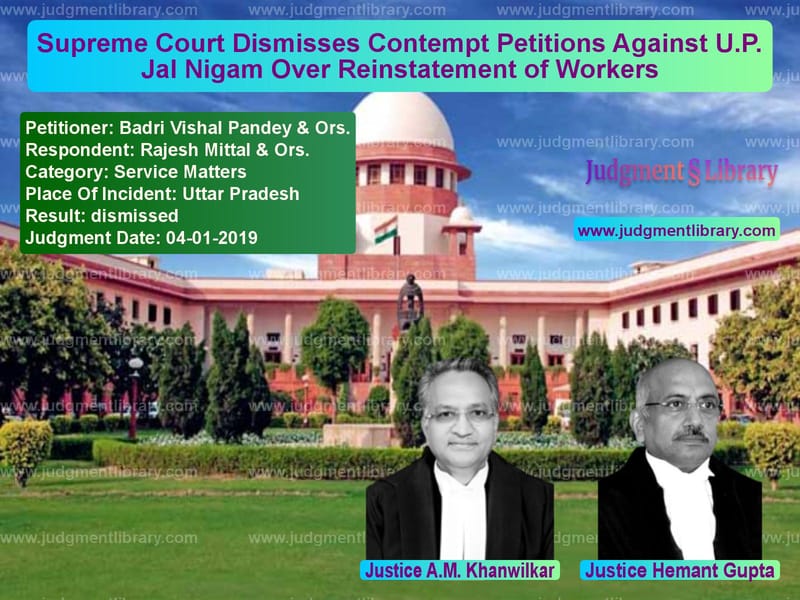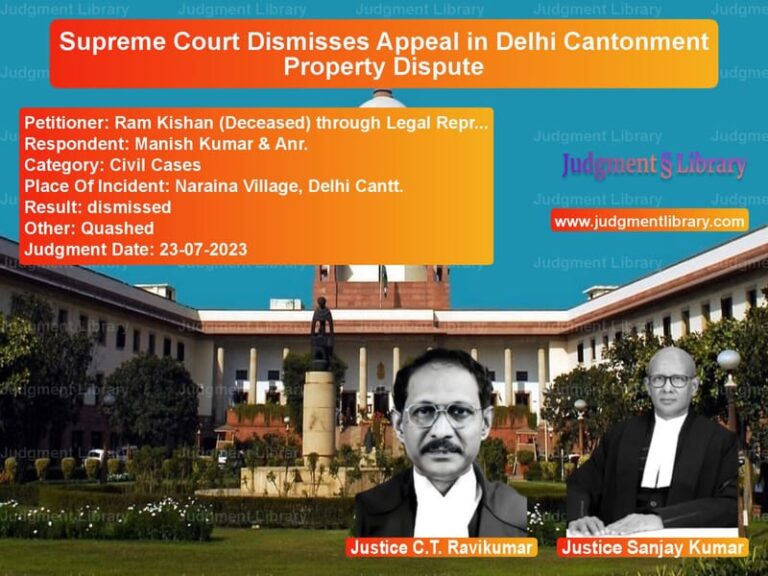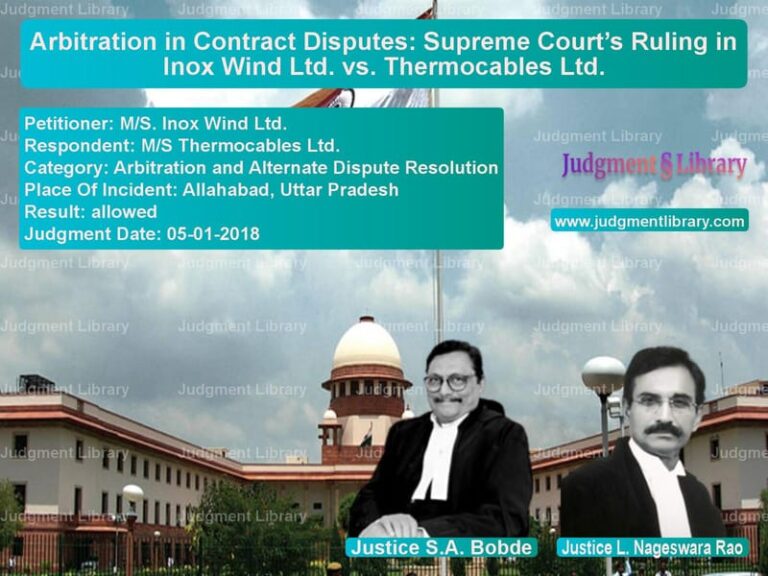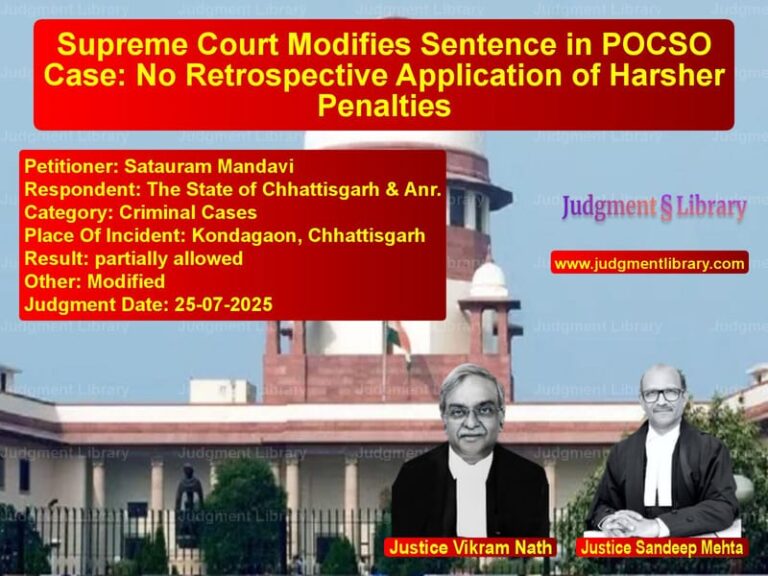Supreme Court Dismisses Contempt Petitions Against U.P. Jal Nigam Over Reinstatement of Workers
The case of Badri Vishal Pandey & Ors. vs. Rajesh Mittal & Ors. involves a contempt petition filed against U.P. Jal Nigam for alleged non-compliance with the Supreme Court’s previous order regarding the reinstatement of retrenched daily wage workers. The Supreme Court dismissed the petitions, ruling that there was no wilful disobedience by the respondents and that reinstatement was never explicitly ordered.
The judgment clarifies the scope of contempt jurisdiction and reaffirms that contempt petitions cannot be used as a means to seek relief that was not granted in the original order.
Background of the Case
The petitioners were daily wage workers employed by U.P. Jal Nigam in various categories, such as Runner, Beldar, and Lab Assistants, before 1991. Due to financial constraints, the services of workers appointed after March 31, 1989, were retrenched on June 22, 1991, following Section 6N of the U.P. Industrial Disputes Act, 1947.
The workers challenged their retrenchment in Writ Petition No. 5686 of 1991 before the Allahabad High Court. In 2009, the High Court ruled that while there was no legal flaw in the retrenchment, U.P. Jal Nigam should give preference to the petitioners for future vacancies.
Subsequently, some petitioners raised an industrial dispute, leading to a Labour Court order in 2009 awarding compensation of Rs. 25,000 and Rs. 2,000 as litigation costs. A fresh round of litigation followed, with different writ petitions being filed before the High Court, culminating in directions for reinstatement without back wages.
U.P. Jal Nigam challenged the reinstatement orders before the Supreme Court via Special Leave Petitions (SLPs), which were disposed of on September 7, 2015, based on an office order dated April 7, 2015, stating that preference would be given to retrenched employees in case of future vacancies.
Key Legal Issues
- Whether U.P. Jal Nigam wilfully disobeyed the Supreme Court’s 2015 order by not reinstating the petitioners.
- Whether the petitioners were entitled to reinstatement under the terms of the High Court orders and office circular dated April 7, 2015.
- Whether contempt jurisdiction could be invoked to enforce reinstatement in the absence of a specific order.
Petitioners’ Arguments
The petitioners contended that U.P. Jal Nigam had misled the Supreme Court by creating an impression that they would be reinstated. Their counsel argued:
“An impression was given before this Hon’ble Court that the respondents would comply with the directions of reinstatement in terms of office order dated 07.04.2015. However, the respondents have deliberately and wilfully disobeyed the orders of this Court.”
The petitioners also pointed to an internal communication dated April 15, 2017, suggesting that 550 vacant Group D posts were available and that they should be reinstated against these vacancies.
Respondents’ (U.P. Jal Nigam) Arguments
The respondents asserted that the April 7, 2015, circular merely provided for preferential reemployment in case of future vacancies and did not guarantee reinstatement. Their submission was:
“The Supreme Court’s order was based on the understanding that retrenched employees would be given preference in future employment, but it did not direct reinstatement. No wilful disobedience has occurred.”
The respondents also argued that due to financial constraints and the transition to contract-based work execution, there were no vacancies for daily wage workers.
Supreme Court’s Observations
The Supreme Court, comprising Justices A.M. Khanwilkar and Hemant Gupta, found no merit in the contempt petitions. The Court ruled:
“There was no specific and categorical direction for reinstatement in the order dated 07.09.2015. The petitioners cannot claim reinstatement based on impressions or assumptions.”
The Court further noted:
“The order of 07.09.2015 was based on the office order dated 07.04.2015, which merely provided for preferential employment subject to the availability of vacancies. There is no wilful disobedience by the respondents.”
Regarding the claim that 550 Group D posts were available, the Court held:
“The availability of Group D posts does not automatically entitle the petitioners to reinstatement. Regular appointments must be made as per applicable recruitment rules.”
Final Judgment
Rejecting the contempt petitions, the Supreme Court ruled:
“The contempt petitions are dismissed, and the rule is discharged. The services of already engaged workmen shall not be affected by this order.”
Significance of the Judgment
- Clarification of Contempt Jurisdiction: The ruling reaffirms that contempt proceedings cannot be used to claim reliefs not explicitly granted by the Court.
- Upholding of Employer’s Discretion: The judgment recognizes that an employer cannot be compelled to make appointments unless directed by law.
- Balancing Workers’ Rights and Financial Constraints: The ruling considers both the rights of workers and the practical limitations faced by public sector employers.
Conclusion
The Supreme Court’s decision in this case highlights the importance of clarity in judicial orders and the limits of contempt jurisdiction. By dismissing the petitions, the Court ensured that employers cannot be forced to reinstate employees without a clear legal mandate. The ruling provides valuable guidance on the interplay between court orders, administrative decisions, and workers’ rights.
Petitioner Name: Badri Vishal Pandey & Ors..Respondent Name: Rajesh Mittal & Ors..Judgment By: Justice A.M. Khanwilkar, Justice Hemant Gupta.Place Of Incident: Uttar Pradesh.Judgment Date: 04-01-2019.
Don’t miss out on the full details! Download the complete judgment in PDF format below and gain valuable insights instantly!
Download Judgment: Badri Vishal Pandey vs Rajesh Mittal & Ors. Supreme Court of India Judgment Dated 04-01-2019.pdf
Direct Downlaod Judgment: Direct downlaod this Judgment
See all petitions in Employment Disputes
See all petitions in Termination Cases
See all petitions in Public Sector Employees
See all petitions in Judgment by A M Khanwilkar
See all petitions in Judgment by Hemant Gupta
See all petitions in dismissed
See all petitions in supreme court of India judgments January 2019
See all petitions in 2019 judgments
See all posts in Service Matters Category
See all allowed petitions in Service Matters Category
See all Dismissed petitions in Service Matters Category
See all partially allowed petitions in Service Matters Category







